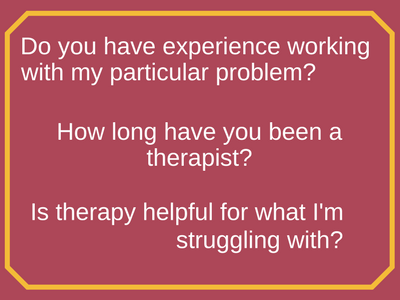Let the journey of self-discovery enrich your life...
It can feel daunting to find a new therapist and start therapy. Therapy requires you to share extremely personal information about yourself and your life — a process that makes you vulnerable — so finding someone you feel good about is vital. Even if you have an appointment with a therapist who was recommended by someone you trust, you’re taking a leap of faith since there is no guarantee you and the referred therapist will be a good match.
Using your intuition
One of the important tasks in “therapist shopping” is to figure out if someone is right for you.
Some determine this through what might be called a “gut feeling.” After a session or two, the experience might be positive, you might come away with a good feeling based upon something the therapist said or because of her/his way of being (thoughtfulness, an attentive and warm presence, for example, or perhaps you feel more comfortable with someone who has a more reserved demeanor).
In other instances, the message from your “gut feeling” might be that this therapist isn’t right for you, and you’ll continue to look for someone who is a better match.
Asking questions
You shouldn’t hesitate to interview a therapist you are considering working with — and if you are already working with someone, it can be helpful to ask questions throughout the treatment. (How does the therapist feel the therapy is going? Why is s/he making that particular recommendation? Is there a different area of exploration s/he thinks might be helpful for you?)
Below are a few questions clients have asked me over the years.
These questions have often led to important conversations about whether or not I’m a good fit for what they are looking for; and for the clients I’m already working with, their questions about the therapy process have led to more effective outcomes.
Level of training
Can you tell me about your training? What does your degree mean?
Picking a therapist can be a bit confusing since there are different degrees that allow professionals to conduct therapy: Licensed professional counselor (LPC); Marriage and family therapist (MFT); Master of Social Work (MSW) or Licensed clinical social worker (LCSW); and a Licensed psychologist (a doctorate degree: PhD or PsyD).
Each degree mentioned above allows someone to conduct therapy, also called psychotherapy or counseling. So psychologists, social workers and counselors are all therapists (they all can do therapy), even though their training varies considerably.
The requirements for each degree differ (the type and amount of training vary across these different professions). Psychologists have the most extensive training, from four to six years of graduate school in order to receive a doctoral degree followed by one to two years of a full-time internship.
You can read more about how psychologists, psychiatrists and social workers differ by visiting the American Psychological Association.
Overall experience
What is your experience working as a therapist?
To help make an informed decision about which therapist you’ll work with, you can interview potential therapists over the phone or during your first meeting. You might want to inquire about her/his types of experience working with clients by asking questions like these:
How long have you been doing therapy?
What do you think your strengths and weaknesses are as a therapist?
Do you have experience working with [the particular issue(s) that brings you to therapy]?
Therapeutic approach
How do you think we should address my problem?
Just as there isn’t one type of client or one type of problem, there isn’t only one way to do therapy (and therefore a therapist shouldn’t impose a certain treatment method on you before getting to know you and what you’re seeking therapy for). There are different treatment approaches (cognitive behavior therapy, psychodynamic, emotion-focused, somatic experiencing, to name a few) that may help you. Asking your therapist why s/he thinks a particular treatment method will be beneficial can help take the mystery out of the therapy process.
 Research shows that therapy is more successful when the treatment method makes sense to the client; there should be an understandable rationale for what unfolds.
Research shows that therapy is more successful when the treatment method makes sense to the client; there should be an understandable rationale for what unfolds.
This doesn’t mean that the therapy will be a completely predictable, linear process — in fact, unexpected turns can often be beneficial (“I didn’t know I was feeling that way”; “I find myself having a bunch of conflicting thoughts the more we talk about this”; “Maybe there’s more to what I’m experiencing than I initially realized”).
Your goals may also change as the counseling proceeds. In these instances, a therapist who is flexible and open to what is unfolding for you might be a better fit for you than a therapist who is highly structured in her/his approach.
In learning about a therapist’s approach, you can better determine whether her/his style fits with your preferences by thinking about these questions:
Do you prefer a more structured treatment approach with between-session “assignments”?
Would you rather the sessions unfold more organically, based upon what you are feeling in the moment and then see where the session takes you?
Do you want to explore childhood issues and see how earlier relational patterns and trauma still might be impacting you?
Are you seeking counseling mainly for rapid symptom relief (i.e., depression, anxiety), or do you want to gain greater insight into the underlying issues that might drive you?
A specific therapy approach might be better suited for you depending on your answers to these (and other, similar) questions.
Assessing progress
How will I know if the therapy is working?
It’s important that you and your therapist discuss your goals early on in therapy. For example, you may want to better manage certain overwhelming life situations, or your goal may be to control certain unwanted behaviors. The status of your goals (and not the therapist’s agenda) should be assessed throughout the therapy.
Let’s say you want to change a certain behavior. Your therapist should explain how his/her approach might help you achieve this goal (e.g., exploring certain feelings that may fuel the behavior; developing alternative coping strategies that may make giving up the target behavior more achievable).
As you and your therapist undertake this process, periodic check-ins that focus on whether or not there is meaningful movement toward your goal will be important. Your subjective experience is essential here:
Are you feeling better (e.g., less anxious or depressed)?
Does it feel like you are being challenged in important ways (and growing emotionally), even if you still feel depressed or anxious?
If there isn’t any meaningful movement (meaningful as determined by you, though your therapist might have thoughts about this also), it will be important to discuss this with your counselor/therapist; More time might be needed. But at some point you may want to explore whether a different approach might prove to be more fruitful than the approach your therapist is currently using.
Ultimately, you are the expert of your experience and you should have a voice about whether or not you believe that meaningful growth is occurring. I believe the earlier these discussions occur in treatment, the better.
Assessing progress (part 2)
Is there a possibility therapy won’t help me?
The research is clear that therapy can be effective for a wide range of psychological and emotional issues. But not everyone improves in therapy, and in some cases, some people can feel worse.
Therapy can intensify difficult feelings, and working through these painful experiences can make the mountain feel steeper before it levels off. The common metaphor of walking through painful experiences rather than around them is often used to capture this therapy phenomenon.
But psychologist and psychotherapy researcher Scott Miller, Ph.D., reports that between 5 and 10% of therapy clients will actually feel worse because of the therapy. As a potential safeguard against a negative therapy outcome, his research suggests that ongoing feedback (from the client) about what is and isn’t working can be helpful in addressing this important issue. In these instances, a different treatment approach may be warranted or additional support or even a different therapist/counselor may be the most responsible treatment decision.
Ideally, you should trust and feel safe enough with your therapist to tell him/her that the therapy isn’t working. Your therapist should want and encourage this type of feedback. Remember, you are the priority and your needs and experiences in therapy should guide the process.
Ending therapy
How will I know when it’s time to stop counseling?
Ending therapy is a very personal decision and there are different reasons why you might choose to stop.
The first is pretty straightforward: you’ve reached your goals and feel ready to end. Or you’ve reached your goals and want to cut back on the frequency of sessions from weekly to every other week (or to monthly or even less frequently) before making the decision to stop completely.
What is less straightforward has to do with whether or not the therapy has stalled — maybe you’ve benefited from the counseling, but the forward movement has leveled off. Again, your subjective experience is what matters here.
I encourage clients to let me know if they are feeling stuck in our work (progress may be slow at times, but that’s different than a therapy that has stalled for some reason). Discussions about feeling stuck can be very fruitful, breathing new life into a therapy that had become lifeless.
If, however, it feels like you’ve given your therapy (and your therapist) enough time to help you reach your goals and you haven’t experienced the outcome you desire (or it feels like a particular therapist has taken you as far as s/he can but you still feel you have work to do), you might want to try another therapist.
~~~
Psychotherapy inherently involves some level of uncertainty. These are the unknowns that must be discovered as the therapy unfolds.
But these unknowns shouldn’t prevent you from asking any questions you may have — questions before you start with a new counselor or questions about ongoing counseling.
In this regard, therapy/counseling is a collaborative journey whereby you are encouraged to ask questions that may be important to you. And in the process of raising questions, you are shaping the therapy in ways that may be better suited to what you’re needing.
And if it feels like your questions are not welcomed by the therapist (or worse, are an annoyance to him/her), then it might be time to find a new therapist.
Richard Nicastro, Ph.D., is a psychologist with over twenty-years of experience in Austin, TX. He offers teletherapy, online sessions to individuals and couples.









